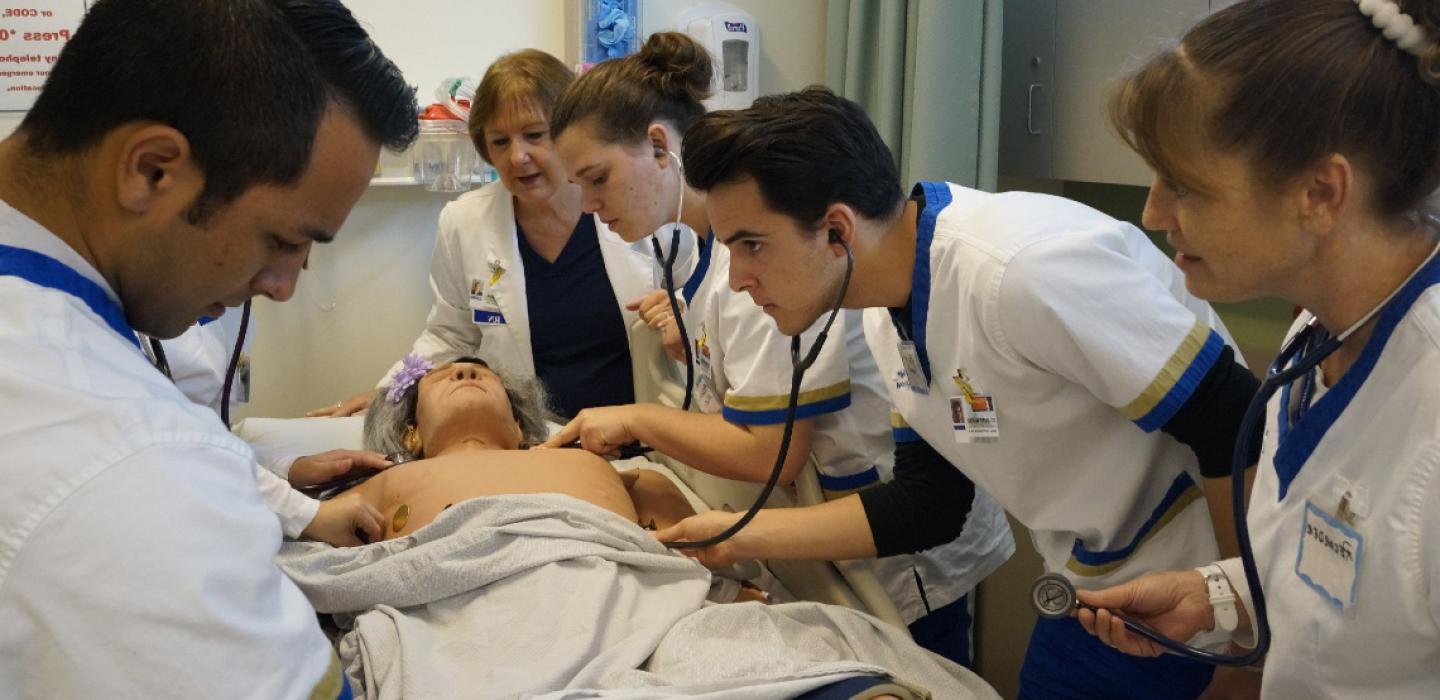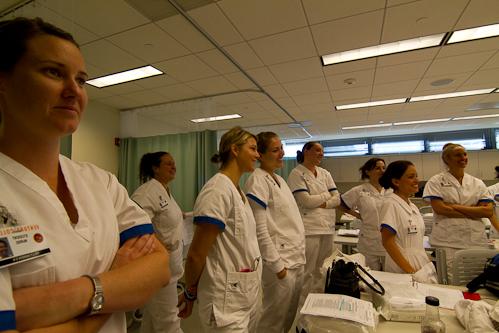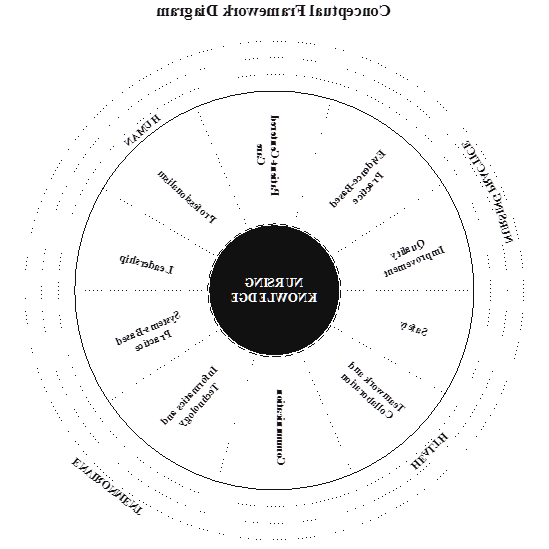Program Philosophy
The nursing education philosophy recognizes that students have individual learning needs, learning styles, readiness, support systems, 以及文化和种族背景. Learning is a continuous, 一生的过程中发生的情感, 认知和精神运动领域, proceeding from simple to complex and enhanced by an environment that motivates the student to apply the theory to practice using critical thinking, evidence based practice, informatics, 临床模拟经验, patient-centered care, and the nursing process.
The faculty use diverse teaching strategies to meet the varied learning styles and learning needs of our diverse students. Faculty are committed to assisting all students to achieve their professional goals by providing a supportive environment for learning and personal growth in an accessible learning environment. Student support programs are utilized to assist students in achieving academic success from entry to graduation.
Education of the nurse at the Associate Degree level prepares the individual as an entry level nurse in the profession of nursing. 护士受过安全教育, competent, caring interventions, 并通过合理的临床决策对患者进行护理管理, communication, and leadership. Integrity, 尊重个人, ethical behavior, accountability, 终身学习是护理的艺术和科学的属性.
The faculty believe that nursing as a profession is an art and science as well as practice discipline that responds to society’s health needs in a caring manner in a variety of environments.
作为一门科学学科, nursing draws on a discrete body of knowledge that incorporates an understanding of the relationships among nurses, patients, 以及健康背景下的环境, 护理概念与理论, 以及从基础科学中衍生出来的概念和理论, humanities, and other disciplines. The science of nursing is applied in practice through a critical thinking framework known as the nursing process that is composed of assessment, diagnosis, planning, implementation, and evaluation. The steps of the nursing process serve as a foundation for clinical decision-making 循证实践. Nurses use critical thinking to integrate objective data with knowledge gained from an assessment of the subjective experiences of patients and groups, and to apply the best available evidence and research data to the processes of diagnosis and treatment. Nurses use clinical reasoning to respond to the needs of the populations they serve. Nurses develop and communicate strategies to support optimal outcomes that are most appropriate to the patient or situation while being mindful of resources utilization. Nurses continually evaluate the quality and effectiveness of nursing practice and seek to optimize outcomes (American Nurses Association [ANA], 2004.
The art of nursing is based on a framework of caring and respect for human dignity. 护理的艺术和科学是密不可分的, as a compassionate approach to patient care carries a mandate to provide care competently and within a systems-based practice. 合格的护理是通过委托提供和完成的, 独立和相互依赖的实践(科洛鲁提斯), 2004, pp. 123-25), and through communication as well as collaborative practice (Tomey, 2009, p. 397) involving other colleagues and/or the individuals seeking support or assistance with their healthcare needs (ANA, 2004, p. 12).
The distinctive focus of the discipline of nursing is on nursing actions and processes, which are directed toward human beings and take into account the environment in which individuals reside and in which nursing practice occurs (Fawcett & Garity, 2009). 这种独特的焦点反映在护理的元范式中, 识别人类(病人), the environment, health, 护理作为护士感兴趣的主观问题(ANA), 2004). 在护理知识的背景下,这些构念的定义如下:
Human beings/patients – 护理者:接受护理或服务的人. This term was selected for consistency and recognition and support of the historically established tradition of the nurse-patient relationship and recipients of nursing care. 患者可以是个人、家庭、团体、社区或人群. Further, 沿着健康-疾病连续体的患者可能独立地发挥作用, interdependent, or dependent roles, 并可能寻求或接受与疾病预防有关的护理干预, health promotion, or health maintenance, 还有疾病和临终关怀. 取决于上下文或设置, 病人有时被称为客户更为恰当, consumers, 或护理服务客户(AACN), 1998, p. 2).
Environment ——一个由内外因素构成的开放的、不断变化的系统, such as physical, psychological, social, 影响生活的文化和精神影响, health, 以及一个人或一个群体的生存. 人与环境相互作用和交流. The nurse achieves patient outcomes by providing a safe and effective health care environment in order to protect patients, families, groups, 以及社区内的其他卫生保健人员.
Health -一种经常用健康和疾病来表达的体验, 并且可能在存在或不存在疾病或损伤(ANA)的情况下发生, 2004, p. 48).
Nursing – is the protection, promotion, 健康和能力的优化, 预防疾病和伤害, alleviation of suffering through the diagnosis and treatment of human response, 并倡导对个人的关怀, families, groups, communities, 和人口(检索ANA, 8-30-2015).
Core Concepts
核心概念源于护理知识的基础. 这些概念包括以下内容:
- Patient-Centered Care
- Professionalism
- 信息学与技术
- Evidence-Based Practice
- Leadership
- Systems-Based practice
- Safety
- Communication
- 团队合作
- Quality Improvement
See model.
Figure 1 : The model is a graphic representation of the core concepts and their relationship to nursing knowledge. In the model, nursing knowledge has been placed at the core to represent how nursing knowledge in its totality reflects the overarching art and science of the nursing profession and discipline. 十大基本概念, 哪些指导护理课程和实践, 从这个核心出发,包括以病人为中心的护理, professionalism, leadership, systems-based practice, 信息学与技术, communication, 团队合作, safety, quality improvement, 循证实践. 概念的顺序并不表示任何层次结构, 因为所有的概念都同等重要. The concepts are connected by broken lines because distinction between individual concepts may be blurred; the concepts overlap and are not mutually exclusive. The concepts are similarly connected to the core by a broken line to indicate the reciprocal and continuous relationship between each of the concepts and nursing knowledge.
改编自2016年马萨诸塞州未来护士
学生学习成果
澳门皇家赌城在线ADN项目的毕业生将展示以下内容:
- Provide safe, quality, culturally appropriate, 以病人为中心的护理, families, and groups supported by evidence-based clinical decisions and patient preferences in a variety of settings.
- Communicate effectively with patients and members of the inter-professional health care team to provide and coordinate safe, quality, patient-centered care.
- Demonstrate leadership and system management knowledge and skills in the delivery of quality health care to patients while contributing to the effectiveness and efficiency of the work unit.
- 整合已建立的法规(加州护士执业法), legal and ethical principles into standard-based professional nursing practice.
证明毕业生已经学到了知识, skills and ethical basis for nursing practice is not only reflected in student accomplishment of level competencies, but also:
- 在NCLEX执照考试中的表现
- Program completion
- Program satisfaction
- Job placement


